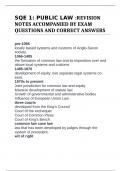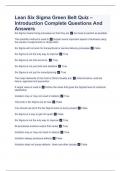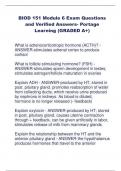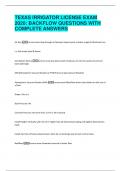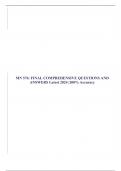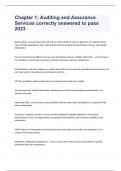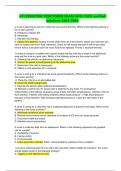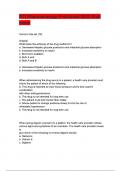NOTES ACCOMPANIED BY EXAM
QUESTIONS AND CORRECT ANSWERS
pre-1066
locally based systems and customs of Anglo-Saxon
society.
1066-1485
the formation of common law and its imposition over and
above local systems and customs
1485-1870
development of equity; two separate legal systems co-
exist.
1870s to present
Joint jurisdiction for common law and equity
Massive development of statute law
Growth of governmental and administrative bodies
Influence of European Union Law.
three courts
developed from the King's Council
Court of the exchequer
Court of Common Pleas
Court of King's Bench
common law case law
law that has been developed by judges through the
system of precedent.
wit of right
,first form of real action- developed from dispute in battle to
form of jury trial
what governs the common law system
rules of precedent
precedent - where a judicial decision establishes or
develops a legal principles or makes a statement of law.
precedents are legal authorities
stare decisis
doctrine of binding precedent
that judges should interpret law consistently in cases
where the facts or issues are the same as previous cases
- following judicial decisions
conditions for english courts to follow a previous
decision
has to be convinced that:
The earlier case was decided in a court which binds it, and
the relevant part of the earlier case is binding, rather than
merely persuasive.
a judgement consists of
- a summary of the facts
- statements of law, which include the ration decidendi and
(often) the obiter dicta
- the court's decision on remedy, which is binding on the
parties in the case.
ratio decidendi
the reason for the decision. The ratio is binding on the
other courts.
ratio- legal principle or rule
material facts
,those on which the decision of the courts depend
obiter dictum
judge comments on an area of law which it is not
necessary to reach a decision in a case.
They are not binding but may be persuasive
can be dissenting judgments ie the view of a judge who
disagrees with the majority of the court
reversing a judgement
if a case goes to appeal and the higher appeal court
disagrees with the lower court.
this does not negate precedent; it simply means the
higher court has NOT applied the law in the same way
overruled
a precedent is overruled if a superior court in a later case
decided that the original precedent set in a past case
is wrong and sets another correct precedent instead.
. Overruling is where a higher court comments on a
previous unrelated decision by a lower court and
declares it to be wrong. The Supreme Court is a superior
court to the Court of Appeal, and the judge is dealing with
unrelated proceedings. Therefore, the judge is overruling
the decision.
affirming a decision
when the higher court upholds what the lower court has
done
distinguishing a decision
When a court avoids following a precedent because the
facts or legal principles differ materially
, Precedent applies to a business property; distinguished for
a private property case.
departing from own precedent
until 1966- not formally recognised as being possible.
departing from the decision as the courts are not on equal
level.
court of appeal departure from precedent
young v bristol aeroplance co lts- court is generally intent
on maintaining its own precedent.
bound by own decisions except:
Three exceptions
- If CA came to previously conflicting decisions, the CA
can select the one to follow
- If the CA's own previous decision has been
overruled expressly or impliedly by the SC
- if the CA's previous decision was made per incuriam
conflict between equity and common law
Earl of Oxford's case- James decided that equity would
prevail over the common law.
equitable remedies
specific performance, injunction, declaration, recission,
rectification
specific performance
order by the court to compel a party to perform something
they have promised to do under contractual agreement.
Generally only available when:
- there is a valid and enforceable contract
-Damages would not be an adequate remedy for the
claimant.
Injunction

